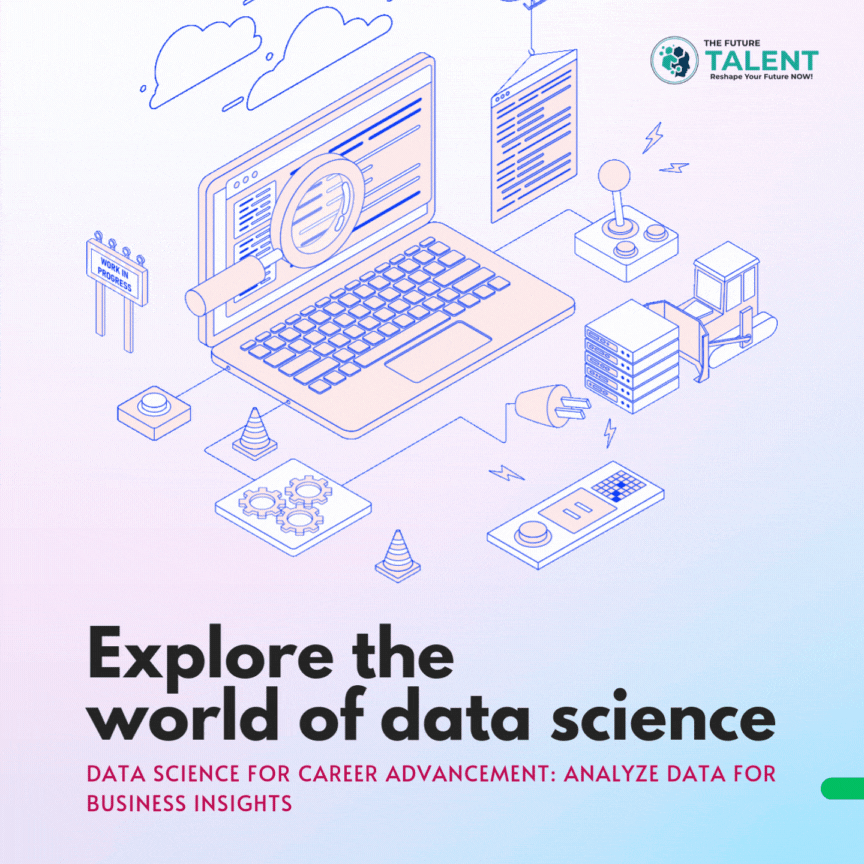
In today’s data-driven landscape, the ability to leverage and interpret data is a pivotal advantage for professionals looking to advance their careers. With its emphasis on deriving actionable insights, data science is becoming an essential skill set across numerous industries. Whether you’re aiming to ascend the corporate hierarchy or transition into a new field, developing expertise in data analytics can greatly improve your career opportunities.
The Role of Data Science in Career Advancement
Data science has transformed the way businesses operate, offering unparalleled insights that drive decision-making and strategic planning. For professionals, this means that acquiring skills in data analytics can open up new opportunities and propel career growth. As organizations increasingly rely on data to make informed decisions, those who can interpret and apply this data effectively are in high demand.
Understanding Data Science and Data Analytics
What is Data Science?
Data science is a field that combines statistical analysis, programming, and domain expertise to extract meaningful insights from data. It involves several key stages, including data collection, processing, analysis, and interpretation. By leveraging various techniques and tools, data scientists can uncover patterns, trends, and relationships within data, leading to informed business decisions.
The Importance of Data Analytics
Data analytics is a subset of data science focused on analyzing data to draw conclusions and support decision-making. It transforms raw data into actionable insights through various methods such as statistical analysis, machine learning, and data visualization. Effective data analytics helps organizations understand market trends, optimize operations, and enhance customer experiences, making it an invaluable skill for professionals.
Key Skills for Data Science and Analytics
Technical Skills
1. Statistical Analysis
Statistical methods are fundamental to data analysis. Understanding techniques such as regression analysis, hypothesis testing, and probability distributions enables professionals to interpret data accurately and make reliable predictions.
2. Programming Languages
Programming languages like Python and R are essential tools for data analysis. Python, with its extensive libraries such as Pandas and NumPy, is widely used for data manipulation and analysis. R, on the other hand, is known for its statistical capabilities and visualization options.
3. Data Visualization
Data visualization tools, such as Tableau and Power BI, play a crucial role in presenting data insights clearly and effectively. These tools help convert complex data into intuitive charts, graphs, and dashboards, making it easier for stakeholders to understand and act upon the information.
4. Database Management
Knowledge of databases and SQL (Structured Query Language) is vital for managing and querying large datasets. Understanding how to extract, manipulate, and manage data from databases is a key component of data analysis.
Soft Skills
1. Problem-Solving
Data science often involves tackling complex problems and finding innovative solutions. Strong problem-solving skills enable professionals to approach data challenges methodically and derive meaningful insights.
2. Communication
Communicating data findings effectively is crucial for ensuring that insights are understood and utilized by stakeholders. Clear and concise communication helps bridge the gap between technical analysis and business decisions.
3. Critical Thinking
Critical thinking involves evaluating data from multiple perspectives and questioning assumptions. It helps professionals interpret data accurately and avoid common pitfalls in analysis.
Applying Data Science to Drive Business Insights
Case Studies of Successful Data Analytics Projects
Numerous companies have leveraged data analytics to drive success. For example, Netflix uses data analytics to recommend content based on user preferences, leading to increased viewer engagement. Similarly, retail giants like Walmart analyze customer purchase data to optimize inventory and personalize marketing strategies.
Tools and Techniques for Data Analysis
Data analytics relies on a variety of tools and techniques, including machine learning algorithms for predictive analysis, big data platforms for handling large volumes of data, and statistical software for performing complex analyses. Familiarity with these tools is essential for effective data analysis.
Common Challenges and How to Overcome Them
Data analytics can present several challenges, such as data quality issues, integration difficulties, and scalability concerns. Addressing these challenges requires implementing robust data governance practices, investing in data cleansing technologies, and ensuring that data systems are compatible and scalable.
Career Opportunities in Data Science and Analytics
In-Demand Roles and Job Titles
The field of data science offers a range of career opportunities, including roles such as Data Analyst, Data Scientist, Business Intelligence Analyst, and Data Engineer. Each role focuses on different aspects of data analysis and requires specific skills and expertise.
Industry Applications
Data science is applicable across various industries, including finance, healthcare, retail, and technology. For instance, in finance, data science is used for fraud detection and risk management, while in healthcare, it helps in predicting patient outcomes and improving treatment plans.
Career Advancement Tips
To advance in a data science career, professionals should continuously update their skills and stay informed about industry trends. Gaining practical experience through projects, participating in relevant training programs, and earning certifications can also enhance career prospects.
Overview of the Program
The Future Talent Data Analytics Program is designed to equip professionals with the skills and knowledge needed to excel in the field of data analytics. The program offers comprehensive training, including hands-on projects, expert-led courses, and certification opportunities.
Benefits for Professionals
By enrolling in The Future Talent Data Analytics Program, professionals can gain practical experience in analyzing data and deriving business insights. The program prepares participants to tackle real-world data challenges and advance their careers in data analytics.






